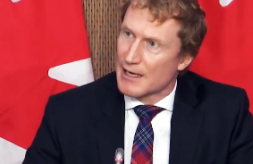
35% Reduction in International Student Visas in Canada
NEW DELHI, Jan 23: Canada on Tuesday announced changes in its immigration policy imposing an immediate two-year cap on new international student visas to tackle a housing crisis and target institutional “bad actors,” a move that is likely to impact Indians planning to study in that country.
Immigration Minister Marc Miller said as part of the cap there would be a 35% reduction in new study visas in 2024. The cap is expected to result in 3,64,000 new approved permits in 2024 as against nearly 5,60,000 study visas were issued last year.
The cap will be in place for two years and the number of permits to be issued in 2025 will be reassessed at the end of this year, he said. “To maintain a sustainable level of temporary residence in Canada, as well to ensure that there is no further growth in the number of international students in Canada for 2024, we are setting a national application intake cap for two years from 2024,” Mr Miller said.
The move comes amid pressure on the federal government from provinces on the increasing numbers of non-permanent residents entering Canada while the country struggles with a housing crisis. Mr Miller earlier this month said a cap on international students would not be a “one-size-fits-all solution” to housing shortages across Canada.
More than 8,00,000 international students were issued temporary study visas in 2022. Mr Miller said last fall that 2023’s numbers were on track to be more than triple the number accepted 10 years ago. The move is expected to impact students from India who see Canada as a preferred destination for higher studies.
India was the first among the top ten origin countries of study permit holders in 2022 in Canada, with a total of 3,19,000 students. Mr Miller said by imposing the cap, the federal government was taking action against some small private colleges. The move would help the government to target institutional “bad actors,” he said. “It’s unacceptable that some private institutions have taken advantage of international students by operating under-resourced campuses, lacking supports for students and charging high tuition fees all the while significantly increasing their intake of international students,” Miller said.
In some provinces, Mr Miller said, the total reduction in permits would be approximately 50%. Provinces and territories will be left to decide how permits are distributed among universities and colleges in their jurisdictions. In addition to the cap, the federal government would also require international students applying for a permit to provide an attestation letter from a province or territory.
“These measures are not against individual international students,” Mr Miller said. “They are to ensure that as future students arrive in Canada, they receive the quality of education that they signed up for and the hope that they were provided in their home countries.”
He also announced changes to the post-graduation work permit programme. Starting in September, international students who begin a programme that’s part of a curriculum licensing arrangement (one where a private college has been licensed to deliver the curriculum of an associated public college) will no longer be eligible for a post-graduation work permit.
Graduates of master’s and other “short graduate-level programmes” will “soon” be able to apply for a three-year work permit, the Government said. Open work permits will also be made available to the spouses of international students in master’s and doctoral programmes.
(Manas Dasgupta)













